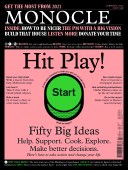
Issue 140
Monocle’s February issue encourages you to hit play on your ideas and ambitions for 2021. Whether you’re hoping to start a local newspaper (or a global one), revive your neighbourhood or set up a sauna in a tent, we have 50 ideas about how to make the year a success. Plus: we speak to Greece’s prime minister about strengthening the country’s national brand.
In This Issue
Oops! No content was found.
Looks like we no longer have content for the page you're on. Perhaps try a search?
Return Home

